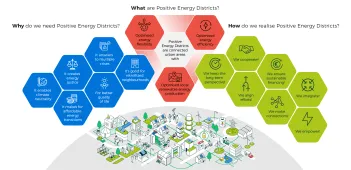PED Framework 3.0: A Policy Guide to Advance Positive Energy Districts in Europe

A timely update in face of evolving urban challenges
Since the first PED Framework in 2019, Europe’s policy landscape, technology base, and climate urgency have shifted significantly. With pilot projects yielding new insights and regulations tightening, urban areas need refreshed guidance. PED Framework 3.0 is the result: an updated policy guide tailored for today’s realities, designed to help cities, regions, and national governments accelerate the transition to climate neutral cities.
“Updating the framework keeps PEDs at the forefront of sustainable urban development, manifesting a European ambition while acknowledging local diversity in driving energy efficiency and renewable energy production in urban areas.” - Christoph Gollner, PED TP Coordinator of the DUT Partnership
Who this framework is for
- European, national, and regional policymakers to align PEDs with broader climate and energy policies
- City-level authorities and practitioners to adapt and implement PED concepts tailored to local environmental, economic, and social conditions
What are PEDs - and why do they matter?
Positive Energy Districts (PEDs) are energy-efficient and energy-flexible urban neighbourhoods or areas of connected buildings and facilities, that produce local renewable energy, achieve net zero greenhouse gas emissions, and actively contribute to overall climate neutrality.

PEDs are crucial in the transition towards climate neutrality and sustainable urban development. They drive innovation and inspire sustainability by not only focusing on reducing greenhouse gas emissions but also optimising the overall energy system.
By linking the technical, social, and economic dimensions of the energy transition, PEDs are positioned as integral drivers of the European Green Deal, the EU Fit for 55 targets, and the Mission of 100 Climate-Neutral and Smart Cities by 2030.